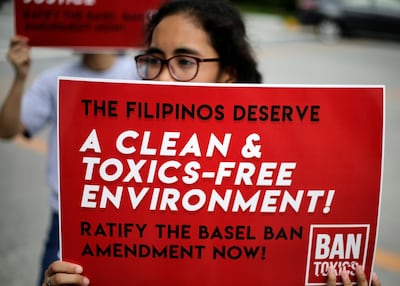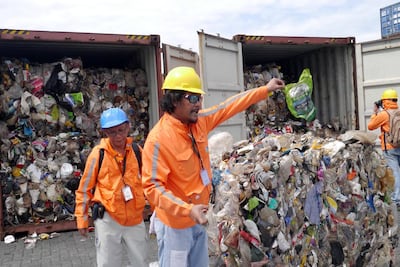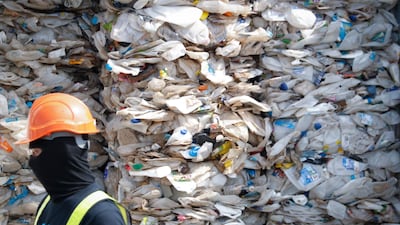In his first term in office as Malaysian prime minister in the 1980s, Dr Mahathir Mohamad announced he had a new policy: "Buy British last", a play on the UK's earlier Buy British campaign. It was a provocative move against the former colonial power, prompted by what Dr Mahathir viewed as Britain's presumptuous and unappreciative treatment of his country. And it worked. Then prime minister Margaret Thatcher sent high-ranking cabinet ministers to plea for an end to the partial boycott, which hurt many British firms, and when her officials returned empty-handed, she capitulated. She hosted a VIP dinner for Dr Mahathir in Number 10 Downing Street and made a series of concessions. As Barry Wain, Dr Mahathir's biographer, put it: "She showed the deference that made the difference." After returning home, Dr Mahathir brought the policy to an end.
This incident came to mind after the Philippines’ government insisted that 1,500 tonnes of rubbish, which had been festering in a port in Manila since being illegally shipped from Canada in 2013 and 2014, ought to be sent back. If it wasn’t repatriated, threatened president Rodrigo Duterte, he would sail over and dump it personally. This – and recalling Manila’s ambassador to Ottawa three weeks ago – appeared to have concentrated minds. The Canadians agreed to take back the household waste that had been mislabelled as recyclable plastic. "This is a demonstration that we're going to comply with our international obligations to deal with waste that originates in Canada," said Sean Fraser, parliamentary secretary to the environment minister.

But it isn't just the Philippines that has been treated as the garbage bin of the developed world. There is increasing uproar in other south-east Asia countries about the amount of rubbish – much of which cannot be recycled, contrary to what many in the US, the UK and other countries believe, when they are sorting through their refuse – arriving on their shores. And arriving it has been, in the hundreds of thousands of tonnes, especially since China decided in 2017 that it didn't want to be the recipient of "foreign garbage" any more.
Malaysia’s environment minister, Yeo Bee Yin, has announced that 3,000 tonnes of plastic waste would be returned to the countries of origin, including Australia, saying they had been brought in under “false declaration”.
"We are urging developed nations to review their management of plastic waste and stop shipping garbage to developing countries," she said. "If you ship to Malaysia, we will return it without mercy."
There is not space here to go into all the problems associated with dealing with waste, not least the fact that only nine per cent of plastic is recycled and, as a former UK minister admitted, somewhat unbelievably: “In environmental terms, it is generally better to bury plastic than to burn it”, even though it can take hundreds of years to decompose.
The larger point is this: what does it say about the attitude of rich western states that they should consider it acceptable to ship their refuse off to developing countries in south-east Asia in the first place?
The US, Canada and Australia in particular are enormous countries with more than enough space to devote to landfill sites. Why should they get to send their rotten food to Malaysian ports or soiled nappies to the Philippines? It could be that much waste disposal is organised on a local rather than national level but governments cannot escape their responsibility. A gesture like Mr Duterte's – which reminded me of Dr Mahathir's "buy British last" policy – is both timely and appropriate. What is troubling is that it should still be necessary today. Why should it take one of Mr Duterte's trademark outbursts for Canada to take its obligations seriously? Do Europeans and westerners still, as Dr Mahathir wrote in his autobiography A Doctor in the House, hold "a very superior attitude. They were always talking down to us and insinuating that our ways were primitive and therefore wrong"?

Of course, no one would publicly admit to taking that view these days, even though much western commentary on east Asian politics and culture remains underinformed and distinctly patronising. But take, for instance, the EU’s proposed ban on palm oil – 85 per cent of which is produced by Malaysia and Indonesia. The argument is not that it’s bad for humans – palm oil is used for everything from cooking oil to soap and lipstick – but that its production causes deforestation and is therefore not “green”. There are several problems with this.
Firstly, Europeans have some cheek complaining about south-east Asians cutting down forests when they have denuded their lands of trees to a far greater extent. Forest cover is 42 per cent in the EU, while the World Bank estimates it is 50 per cent for Indonesia and 67 per cent for Malaysia. Secondly, both Asian governments have taken serious steps to ensure the palm oil industry meets standards of sustainability and have limited permits for new plantations. Thirdly, as Luhut Pandjaitan, an Indonesian minister, says: “This move is a double standard, a pure discrimination. The EU accepts soybeans, which use 10 times more land than palm oil to cultivate.” And fourthly, the jobs of millions of Indonesians and Malaysians, many of them smallholders, would be threatened by the ban.
So the irony is that wealthy European countries are prepared to consider destroying the livelihoods of hundreds of thousands of poor people because of supposed environmental concerns while at the same time they are happy to pollute this pristine nirvana by treating it as their rubbish dump, sending it all the waste they can’t be bothered to get rid of at home. If that prompts a fiery response from a Mahathir or a Duterte, it will be richly deserved.
Sholto Byrnes is a Kuala Lumpur-based commentator and consultant and a corresponding fellow of the Erasmus Forum


